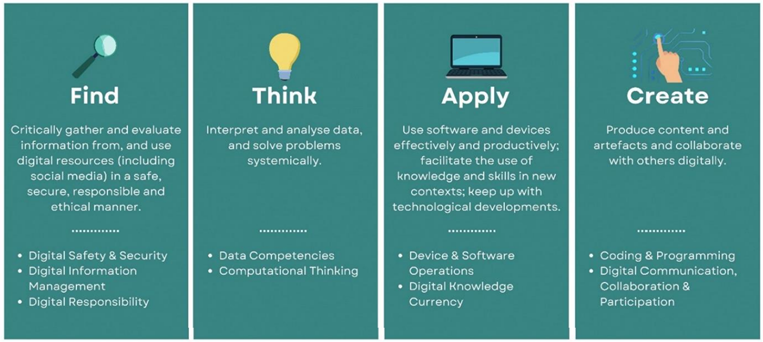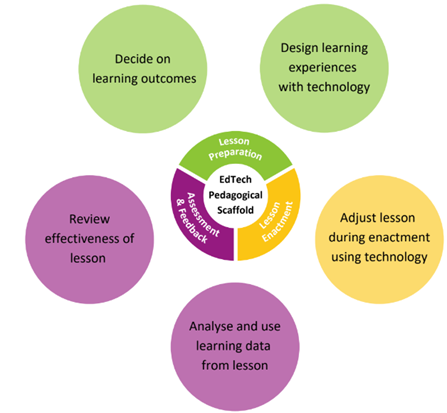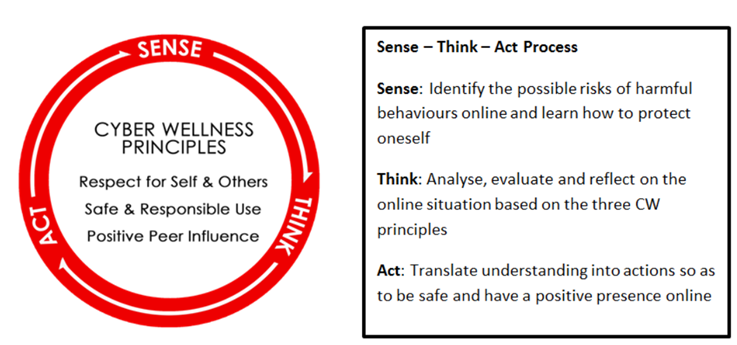Information and Communication Technology (ICT)
Vision
Self-directed and future-ready responsible
digital learners
Mission
Purposeful and meaningful use of technology
in Teaching and Learning to nurture E21CC future-ready learners
Message from Subject Head ICT, Mdm Chen Jing Ting
As a Subject Head in ICT, I believe in the purposeful and meaningful use of technology to enhance teaching and learning, nurturing self-directed, future-ready, and responsible digital learners. Through a well-designed ICT curriculum, effective integration of EdTech, and a robust school infrastructure, I strive to equip students with 21st-century competencies while empowering teachers to create engaging learning experiences. My goal is to build a technology-enabled environment that supports innovation, collaboration, and lifelong learning.
Curriculum Framework & Description
Committee Focus
Our programmes are aligned with the Transforming Education through Technology Masterplan 2030, which guides schools in leveraging technology to enhance teaching and learning. Our ICT committee is committed to equipping both students and teachers with essential digital competencies while fostering a safe and responsible online environment.
Our focus is on three key areas:
1. Digital Literacy & Technological Skills
Aligned with the Find, Think, Apply, Create (FTAC) framework, our programme aims to nurture pupils into confident, critical, and responsible users of digital technologies. This holistic approach ensures that pupils are empowered to take ownership of their learning, using technology effectively for research, collaboration, and problem-solving in an ever-evolving digital landscape.

2. Integrating EdTech to Enrich Teaching and Learning
Teachers are empowered through professional development to design technology-enhanced lessons that promote interactive and collaborative learning. By leveraging EdTech tools and platforms, lessons become more engaging and tailored to diverse learning needs.
In our classrooms, we harness e-Pedagogy to foster active learning. Through the purposeful use of technology, we create engaging, data-informed, and student-centred experiences. Teachers refer to the EdTech Pedagogical Scaffold to guide the design and facilitation of technology-enhanced learning, ensuring meaningful and effective integration throughout the lesson.

3. Cyber Wellness
We prioritise the well-being of our pupils in the digital realm. Our Cyber Wellness programme uses the Sense-Think-Act approach to develop a child’s instinct to act responsibly in cyberspace. This approach is grounded in three guiding principles:
-
Respect for Self and Others: Developing an understanding of the impact of online actions and recognising the importance of respecting oneself and others in the digital space.
-
Safe and Responsible Use: Reflecting on how to use technology safely, responsibly, and ethically, while safeguarding personal information.
-
Positive Peer Influence: Encouraging pupils to make responsible decisions and influence their peers to contribute positively to the online community.
Through engaging activities and lessons, we equip pupils with the knowledge and skills to navigate the internet safely and responsibly. They learn to be ethical, responsible users of technology, fostering a safe and positive online environment. Our cyber wellness education also helps pupils develop self-management skills, enabling them to make informed decisions and maintain a healthy balance in technology use.

Partnership with Parents
We believe that a strong partnership with parents is crucial in reinforcing ICT learning and Cyber Wellness at home. We provide resources and workshops to help parents stay informed about the latest digital trends and equip them with strategies to support their children's digital journey. By working together, we aim to create a consistent and supportive environment for our pupils both at school and at home.

